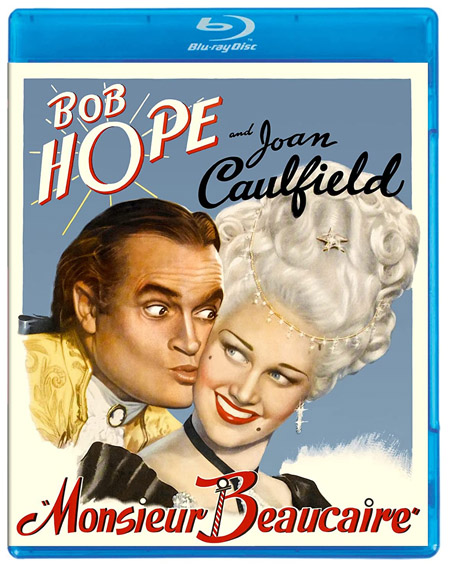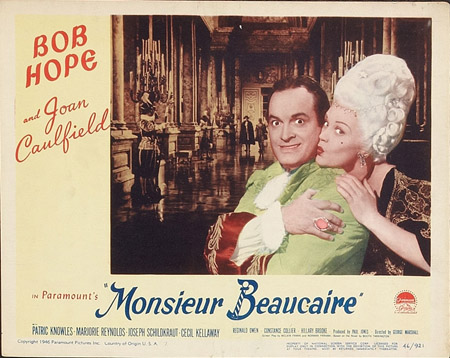
“BOB
THE BARBERâ€
By
Raymond Benson
One
of actor/comedian Bob Hope’s most cherished films is Monsieur Beaucaire,
a 1946 remake of a Rudolph Valentino silent picture from 1924, both of which are
based on a 1900 novel by Booth Tarkington. Hope’s version, directed by George
Marshall, is certainly a loose adaptation because it turned what was a
historical romantic drama into a flat-out comedy.
Woody
Allen has been known to cite early Bob Hope movies as an inspiration for his
onscreen persona in the director’s early “zany†comedies like Bananas and
Sleeper. When one views something like Monsieur Beaucaire or My
Favorite Blonde (1942), the comparison is strikingly apt. Hope creates a
persona of nervous mannerisms, lack of self confidence masked by bravado, clumsy
but endearing interaction with the opposite sex, and witty one-liners. Beaucaire
exhibits Hope in fine form, producing a good deal of laughs as well as
swashbuckling action.
The
tale is set sometime in the 1700s. Beaucaire (Hope) is the royal barber to King
Louis XV (Reginald Owen). King Philip V (Howard Freeman) of Spain has suggested
a solution to prevent war between their two countries—marrying off Princess
Maria (Marjorie Reynolds) of Spain to a suitor of Louis’ choosing. Louis
decides that Duc le Chandre (Patrick Knowles), a dashing swordsman and lady’s
man, to be the lucky groom. Actually, Louis wants le Chandre out of France
because they both have eyes on the same woman, Madame Pompadour (Hillary
Brooke). Never mind that Louis is still married to the queen (Constance
Collier). Beaucaire is in love with scullery maid Mimi (Joan Caulfield), but
Mimi has loftier goals of seducing the king himself and being one of his mistresses.
After a series of mistaken identities, the king banishing both Mimi and
Beaucaire to Spain for something they didn’t do, and le Chandre being forced to
go into hiding because of another mix-up, the duke and Beaucaire trade places
and travel together while impersonating one another. In Spain, nasty Don
Francisco (Joseph Schildkraut) is determined to stop the marriage between Maria
and le Chandre because he wants war between Spain and France so that he
can usurp his king. Once in Spain, Beaucaire—as le Chandre—must juggle several
risky situations to keep up the subterfuge, help le Chandre and Maria (who do
end up falling in love), and finally win over Mimi.

As
with most Bob Hope vehicles, there are musical numbers, slapstick routines,
and, here, some swashbuckling set pieces, all in period costumes with those
wacky powdered white wigs (in fact, one early comic piece involves Beaucaire,
the king, and the powder). Joan Caulfield is a worthy foil for Hope, and
Patrick Knowles provides adequate straight man/dashing hero duties. The always
reliable Joseph Schildkraut makes a good slimy villain, and there are plenty of
other supporting folks who add merriment to the proceedings. Director Marshall
keeps the picture moving at a brisk pace, and the script by Hope regulars
Melvin Frank and Norman Panama is clever and sharp.
Kino
Lober’s new Blu-ray release is a high definition transfer that looks good and
does the job. Unfortunately, there are no supplements on the disk apart from
theatrical trailers from this and other Bob Hope titles.
Monsieur
Beaucaire is
for fans of Bob Hope, Hollywood comedies of the 1940s, and excuses to while
away approximately 90 minutes with a smile on the face.
CLICK HERE TO ORDER FROM AMAZON